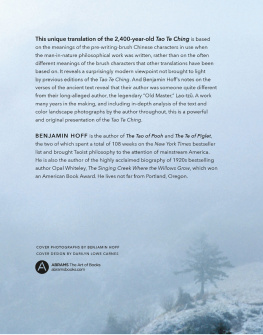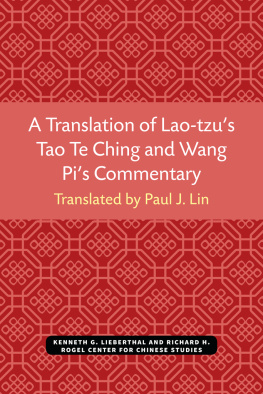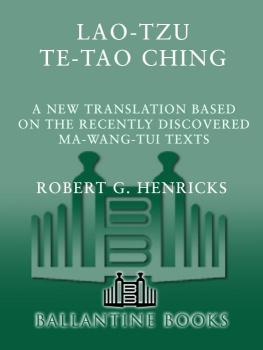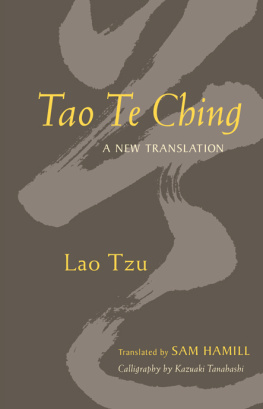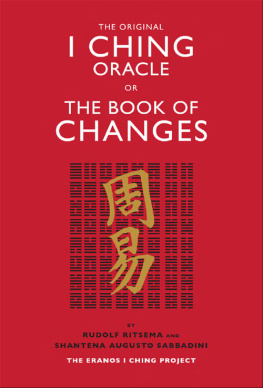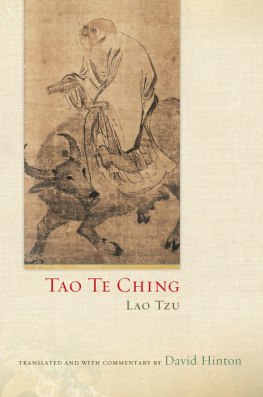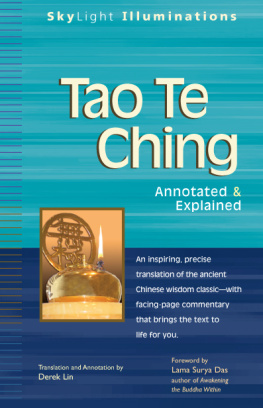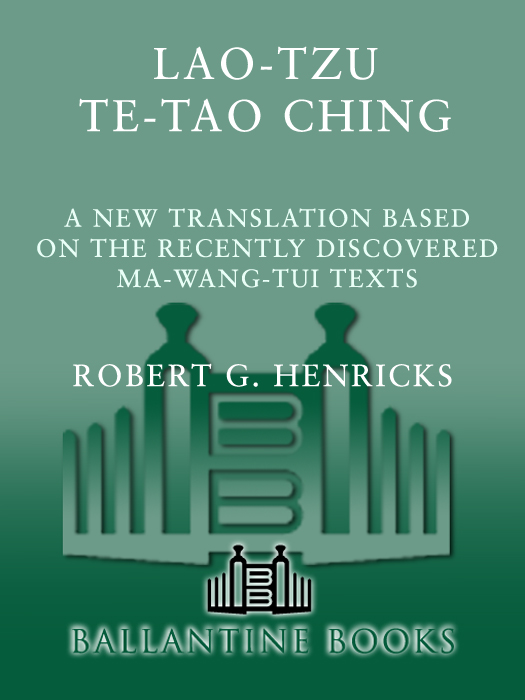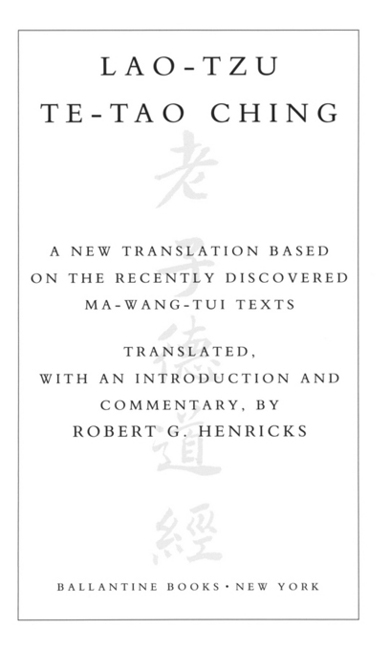Professor Henricks new volume has two special merits for the general reader: One is that he succinctly explains the most recent discoveries in texts of the famous classic by Lao-tzu. The second merit of the Henricks translation is its sophistication and simplicity [Mr. Henricks] presents a version of each line which makes comparative sense out of phraseology that to some translators has seemed incomprehensible and inscrutable.
John K. Fairbank
Francis Lee Higginson Professor of History
Emeritus, Harvard University
No one can understand Chinese philosophy, religion, art, or social ethics without reading [the Te-Tao Ching]. We welcome, therefore, the translation of the recently discovered, the earliest, the most authentic, twenty-century old text [It] will remain required reading for a long time whether in the classroom or in the home.
Wing-tsit Chan
Author of The Way of Lao-tzu and
A Sourcebook in Chinese Philosophy
ALSO IN THIS SERIES
SUN-TZU: THE ART OF WARFARE
THE FIRST ENGLISH TRANSLATION
INCORPORATING THE RECENTLY
DISCOVERED YIN-CHUEH TEXTS
TRANSLATED, WITH AN
INTRODUCTION AND COMMENTARY,
BY ROGER T. AMES
A Ballantine Book
Published by The Random House Publishing Group
Translation and New Text Copyright 1989 by Robert G. Henricks
All rights reserved.
Published in the United States by Ballantine Books, an imprint of The Random House Publishing Group, a division of Random House, Inc., New York, and simultaneously in Canada by Random House of Canada Limited, Toronto.
Ballantine and colophon are registered trademarks of Random House, Inc.
Grateful acknowledgment is made to Macmillan Publishing Company for permission to reprint excerpts from The Way of Lao Tzu by Wing-tsit Chan. Copyright 1964 by Bobbs-Merrill Company. Reprinted with permission of Macmillan Publishing Company.
Library of Congress Catalog Card Number: 91-90641
eISBN: 978-0-307-77534-4
Calligraphy by K. S. Wong
www.ballantinebooks.com
v3.1
For Herrlee Glessner Creel
Who will undoubtedly disagree with my
interpretation of the Lao-tzu but whose
strong support of my work on the Ma-wang-tui
texts has meant a great deal.
CONTENTS
PREFACE
In the winter of 1976 I read through the Ma-wang-tui texts of Lao-tzu with a colleague and two students and immediately, and excitedly, had thoughts of doing a translation. The following year, doctoral dissertation out of the way, I began to study the texts seriously, being initially interested in determining how they differed from later texts of the Lao-tzu and why. One project seemed to lead to another, such that over the years I ended up publishing no less than ten articles on the texts, the original thought of doing a translation now far from my mind.
I was delighted, therefore, to receive a phone call from Owen Lock, editor in chief of Del Rey Books (an imprint of Ballantine Books), in November 1986, asking whether I might be interested in translating the Ma-wang-tui texts for popular consumption. Giving the matter some thought, I soon saw that this would give me the opportunity to bring to a completion in some ways the previous work I had done on the texts; at the same time, this makes available for the general readership the latest knowledge we have of this important text in Taoism.
I am indebted to Owen Lock for having the foresight to realize the significance of this project and for his support of and belief in my work. I also owe much to my good friend Richard Gotshalk, who first urged me to look into this text many years ago. Dick and I have had many long talks together over the years about the philosophy of this text, and he carefully read through my first draft translation and introduction and suggested a number of important changes and different ways in which the text might be read. Finally I want to thank my colleague at Dartmouth, Li Hua-yan Mowry, who kindly, as she has done on many occasions before, went over a number of troubling passages in the text with me, sharing with me her sense of the text from the point of view of a native speaker.
INTRODUCTION
Specialists on Chinese religion and thought find it useful to distinguish, initially at least, between the Taoist religion on the one hand and philosophical Taoism on the other. We agree in dating the formal beginning of the Taoist religion to the establishment of the Celestial Master Sect, c. A.D . 150, by a man named Chang Taoling; philosophical Taoism is best represented for us in the thought of two texts written in early China, one called the Chuang-tzu, which preserves the ideas of the philosopher Chuang Chou (fl. 350-320 B.C .), the other an anonymous product known as the Lao-tzu (which means the Old Master or Old Philosopher) or the Tao-te ching (The Book of the Way and Its Power). The Lao-tzu, like the Chuang-tzu, probably represents currents of thought in China around 300 B.C ., though by tradition the Lao-tzu was written by a contemporary of Confucius named Li Erh, Confucius dates being 551-479 B.C.
There are many similar ideas in the texts of Lao-tzu and Chuang-tzu; there are major differences between the two texts as well. For example, a good part of the Lao-tzu is addressed to the man who would be king and is concerned with the correct, Taoist way to rule; Chuang-tzu has no interest in social-political matters. Chuang-tzus message is addressed to the rugged individualist who turns his back on social commitment in his search for the fulfilled life. There are also major differences between the two books in style. The Chuang-tzu is composed of thirty-three chapters, each chapter a mixture of philosophic discourse, anecdote, fable, and tale, stories filled with delightful, unforgettable characters. The Lao-tzu, by contrast, has a total of eighty-one chapters, each one being more like a poem in form.
I. THE MA-WANG-TUI TEXTS
A number of extraordinary textual discoveries have been made by archaeologists in China in the last twenty years, those discoveries providing the reason, and the materials, for the present translation series. At Yin-cheh-shan in Shantung, for example, portions of a number of early philosophical textsincluding the Kuan-tzu, the Yen-tzu chun-chiu, and the militarist treatises Sun Pin ping-fa and Sun Wu ping-fa (i.e., Sun-tzus Art of War)have been unearthed; while at Shui-hu-ti in Hupeh archaeologists found, among other things, materials relating to a Chin (221-207 B.C .) code of law.
Of greatest significance to date, a tremendous discovery was made in the last months of 1973 in south-central China near Changsha (Hunan Province) in the small village of Ma-wang-tui. In Han Tomb No. 3 at Ma-wang-tui, the grave of the son of a man named Li Tsang, Li Tsang having been marquis of Tai and prime minister of Changsha in early Han dynasty times, archaeologists discovered a rich cache of funerary goods including a large group of texts. An inventory slip in the tomb informs us that this man was buried on the equivalent in the Western calendar of April 4, 168 B.C ., thus providing a terminus ante quem for these materials. But more precise dating is possible in some cases based on the style of the calligraphy used and the practice of taboo-name avoidancethe personal name of an emperor in ancient China was not to be used in texts copied during his reign (more on these matters below).


